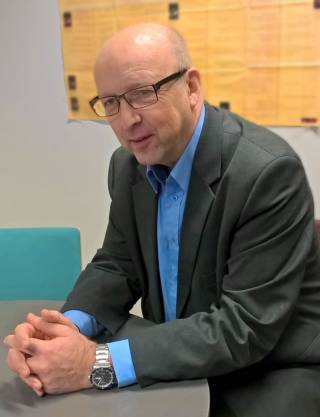
- Senior Lecturer of Education in the field of Lifelong Learning and Education at the University of Tampere
- Docent at the Universities of Helsinki and Jyväskylä in the fields of University Pedagogy and Guidance in Higher Education
- Leader of the HET group with Marita Mäkinen
How did you become a researcher?
For me the way to become a researcher has been rather meandering. I originally graduated from the commercial sector in vocational education but I have always had an interest in the issues of learning, human development and identity. That interest gradually led me to study educational sciences at the university even though I never saw myself as a teacher at school. My interest has always been focused more broadly on learning and education in different stages of life-course and so after graduating from university I got jobs as an education planner in Institute of Further Education and then as amanuensis in the Department of Nursing at the University of Tampere. Through my work in these places I got involved in various national and international development projects. Working in different projects included also research and inspired me to begin my own dissertation and doctoral studies. As a doctoral student I got a temporary post as Senior Assistant in the Departments of Education and Teacher Education at the University of Tampere and through these posts I became a researcher and a lecturer as well. Currently, I am holding also a docentships in the Universities of Helsinki and Jyväskylä.
How did you become a member of the HET research group and what is your role in the group?
In the HET research group I am working currently as a leader with Marita Mäkinen. I am also a team leader in two of the HET subgroups, the Student Experience and Learning team with Terhi Mäntylä as a team co-leader and in the Internationalisation team as a team leader.
The initial HET research group was founded by me and few other researchers after the research and development project entity called Campus Conexus in which we had conducted research from several perspectives on changing conditions of higher education. The HET group at that time was quite small and so we decided to merge with another small research group that had been founded after Campus Conexus as well, the EGE group. Together we formed the present HET research group with four subgroups.
What kind of research are you conducting at the moment?
For the time being I am involved in several collaboration projects with different colleagues from different universities. For example with the colleagues working at University of Helsinki we have been conducting a research both on student engagement and on academic and pedagogical leadership. E.g., we have been collecting a national data on student engagement from which we are currently preparing several papers for international journals. Also with the colleagues at University of Jyväskylä there has been some collaboration in the field of higher education studies concerning the delayed and problematic studying paths.
Most recently, I have been conducting a research concerning the employment of the highly educated graduates in cooperation with the Portuguese colleagues. In this particular research we are comparing the Finnish and Portuguese students and their employment after graduating. We also recently published a paper on the issue and are planning to continue the research.
Research concerning internationalisation has also been under preparation with different co-operation parties. In one particular study focused on teachers in higher education we compared Finnish, Swiss and German university teachers and their conceptions of their roles amidst the increasing challenges of internationalisation. We discovered that the changes and challenges are very similar regardless the country of the teacher.
Many of the recent changes in higher education and its operating environment has made me interested in societal aspects of learning and education. In my own research the focus has recently shifted gradually from the pedagogical issues towards the social and cultural issues. I often try to perceive things from a societal and life-course frameworks and combine these perspectives in the same research.
What it’s like to be a researcher?
I think that as a researcher one is able to reach the issues one finds interesting and important. Research is also one way to influence and improve things in the society. Moving out from one’s comfort zone is also a challenge that a researcher often has to face. I have, for example, crossed the borders as a researcher both methodologically by conducting research with both quantitative and qualitative methods and crossed lines between the disciplines by working in different faculties and also by cooperating with experts with different backgrounds. Leaving the comfort zone challenges one’s thinking and widens one’s perspectives and it is possible to have new insights and fruitful learning experiences.
What is challenging in being a researcher?
As a researcher there is a constant need to absorb new knowledge and familiarise oneself profoundly with new matters. Sometimes there is a risk that one gets too much engaged with the work and tires out. Therefore it is very important to be aware of one’s own well-being and have also other activities outside work.
What is inspiring in being a researcher?
What I find best in conducting a research is to be able to find new perspectives, make new interesting discoveries and have new insights. Doing a research is very inspiring and engaging at times and therefore it is also important to find ways relaxing and disengaging oneself from the work. Music has always been an activity that inspires and gives energy for me. I play some instruments myself (guitar, bass) and that has been a very good way for me to disengage from work.
References (these recent publications were referred in the text):
Korhonen, V. & Weil, M. 2015. Internationalisation of Higher Education: Perspectives on Self-Conceptions in Teaching. Journal of Research in International Education, 14, 198-212.
Gaio Alves, M. & Korhonen, V. 2016. Transitions and trajectories from higher education to work and back – A comparison between Finnish and Portuguese graduates. European Educational Research Journal, DOI: 10.1177/1474904116661200.
Korhonen, V., Inkinen, M., Matsson, M. & Toom, A. 2016 (Submitted). Student engagement and the transition from the first to second year in higher education. In Eva Kyndt, Vincent Donche, Keith Trigwell and Sari Lindblom-Ylänne (Eds.) Higher Education Transitions. London: Routledge.

